|  Arts
& Letters Arts
& Letters
On the Shelf
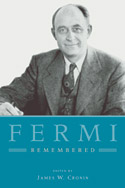 Fermi
Remembered, edited by James Cronin, SM’53, PhD’55,
University of Chicago Press. Adding a new chapter to Enrico
Fermi’s memory, this book features reminiscences from 25 scientists,
including U of C physics professor emeritus Cronin and several other
Nobel Prize winners, who knew the world-changing physicist, as well
as pages from Fermi’s own notebooks, correspondences, speeches,
and teaching materials. Through his research Cronin uncovered such
gems as a 1945 letter in which Fermi, who oversaw the first self-sustaining
nuclear chain reaction, describes his vision for the Chicago research
institute that now bears his name. Fermi
Remembered, edited by James Cronin, SM’53, PhD’55,
University of Chicago Press. Adding a new chapter to Enrico
Fermi’s memory, this book features reminiscences from 25 scientists,
including U of C physics professor emeritus Cronin and several other
Nobel Prize winners, who knew the world-changing physicist, as well
as pages from Fermi’s own notebooks, correspondences, speeches,
and teaching materials. Through his research Cronin uncovered such
gems as a 1945 letter in which Fermi, who oversaw the first self-sustaining
nuclear chain reaction, describes his vision for the Chicago research
institute that now bears his name.
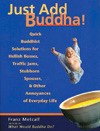 Just
Add Buddha: Quick Buddhist Solutions to Hellish Bosses, Traffic
Jams, Stubborn Spouses, & Other Annoyances of Everyday Life,
by Franz Metcalf, PhD’97, Ulysses Press. Daily life got you
down? Just add Buddha and watch your attitude change. That’s
advice from Divinity School–grad Metcalf, who offers a variety
of techniques—instant relaxations, fast visualizations, and
so on—for dealing with quotidian hassles such as difficult
coworkers. The Buddhist bonus to transforming those situations,
he proposes, is a stronger spiritual foundation. Metcalf’s
do-it-yourself approach aims to demystify Buddhism so that even
karmic beginners can enter the path to enlightenment. Just
Add Buddha: Quick Buddhist Solutions to Hellish Bosses, Traffic
Jams, Stubborn Spouses, & Other Annoyances of Everyday Life,
by Franz Metcalf, PhD’97, Ulysses Press. Daily life got you
down? Just add Buddha and watch your attitude change. That’s
advice from Divinity School–grad Metcalf, who offers a variety
of techniques—instant relaxations, fast visualizations, and
so on—for dealing with quotidian hassles such as difficult
coworkers. The Buddhist bonus to transforming those situations,
he proposes, is a stronger spiritual foundation. Metcalf’s
do-it-yourself approach aims to demystify Buddhism so that even
karmic beginners can enter the path to enlightenment.
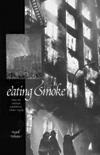 Eating
Smoke: Fire in Urban America, 1800–1950, by Mark Tebeau,
AB’88, Johns Hopkins University Press. Forget Ladder
49, John Travolta’s latest film foray. For the true story
of the heroic firefighter’s role in urban America, turn to
Tebeau’s investigative account. Drawing on fire-department
and insurance-company archives, he shows how both groups helped
make the nation’s shift to industrialization—plagued
in its early days by catastrophic blazes—safer. Tebeau, whose
father was a firefighter, details the changing practices that led
to improved building codes, hydrants, and other reforms. Eating
Smoke: Fire in Urban America, 1800–1950, by Mark Tebeau,
AB’88, Johns Hopkins University Press. Forget Ladder
49, John Travolta’s latest film foray. For the true story
of the heroic firefighter’s role in urban America, turn to
Tebeau’s investigative account. Drawing on fire-department
and insurance-company archives, he shows how both groups helped
make the nation’s shift to industrialization—plagued
in its early days by catastrophic blazes—safer. Tebeau, whose
father was a firefighter, details the changing practices that led
to improved building codes, hydrants, and other reforms.
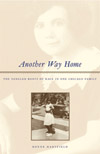 Another
Way Home: The Tangled Roots of Race in One Chicago Family,
by Ronne Hartfield, AB’55, AM’82, University of
Chicago Press. Hartfield’s memoir focuses on miscegenation’s
role in her family’s history. Spanning most of the 20th century,
the tale begins with her mother, Day Shepherd—born to a wealthy
British plantation owner and the mixed-race daughter of a former
slave—navigating life in the South. It follows Shepherd as
she migrates to Bronzeville, a black neighborhood on Chicago’s
South Side. Through Shepherd’s experiences, and later Hartfield’s,
the book portrays the challenges facing American women of mixed
race, played out against the backdrop of such significant periods
as the Great Depression and the start of the civil rights movement. Another
Way Home: The Tangled Roots of Race in One Chicago Family,
by Ronne Hartfield, AB’55, AM’82, University of
Chicago Press. Hartfield’s memoir focuses on miscegenation’s
role in her family’s history. Spanning most of the 20th century,
the tale begins with her mother, Day Shepherd—born to a wealthy
British plantation owner and the mixed-race daughter of a former
slave—navigating life in the South. It follows Shepherd as
she migrates to Bronzeville, a black neighborhood on Chicago’s
South Side. Through Shepherd’s experiences, and later Hartfield’s,
the book portrays the challenges facing American women of mixed
race, played out against the backdrop of such significant periods
as the Great Depression and the start of the civil rights movement.
The Remnants of War,
by John Mueller, AB’60, Cornell University Press.
Note to war presidents: armed conflict is out of fashion. That’s
according to Mueller, an expert on national security policy at Ohio
State University, who describes war as “merely an idea, an
institution, like dueling or slavery.” As developed nations
abandon armed conflict as a way to negotiate with other countries,
he argues, war is declining. Today most battles are internal conflicts
that stem from ineffective governments, he believes, not ethnic
or religious rivalries. He favors domestic policing as a way to
reestablish civic order.
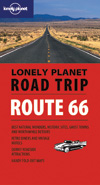 Lonely
Planet Road Trip Route 66, by Sara
Benson, AB’95, Lonely Planet Publications. Benson’s
take on the quintessential American drive supplies more than the
usual guidebook fodder (maps, where to stay, where to eat, etc.).
Sidebars also provide tidbits on topics such as nostalgic road music
and short side trips. Not straying too far from the genre, she covers
the major historic and natural sites along the 2,200-mile trek from
Chicago to Los Angeles—Civil War battlefields, presidential
homes, the Grand Canyon, and the Mojave Desert, among others. And
to get your kicks, there’s information on quirky attractions,
including the Gemini Giant, Cadillac Ranch, and Jackrabbit Trading
Post.—M.L. Lonely
Planet Road Trip Route 66, by Sara
Benson, AB’95, Lonely Planet Publications. Benson’s
take on the quintessential American drive supplies more than the
usual guidebook fodder (maps, where to stay, where to eat, etc.).
Sidebars also provide tidbits on topics such as nostalgic road music
and short side trips. Not straying too far from the genre, she covers
the major historic and natural sites along the 2,200-mile trek from
Chicago to Los Angeles—Civil War battlefields, presidential
homes, the Grand Canyon, and the Mojave Desert, among others. And
to get your kicks, there’s information on quirky attractions,
including the Gemini Giant, Cadillac Ranch, and Jackrabbit Trading
Post.—M.L.
|
|


 Arts
& Letters
Arts
& Letters Fermi
Remembered
Fermi
Remembered Just
Add Buddha: Quick Buddhist Solutions to Hellish Bosses, Traffic
Jams, Stubborn Spouses, & Other Annoyances of Everyday Life
Just
Add Buddha: Quick Buddhist Solutions to Hellish Bosses, Traffic
Jams, Stubborn Spouses, & Other Annoyances of Everyday Life Eating
Smoke: Fire in Urban America, 1800–1950
Eating
Smoke: Fire in Urban America, 1800–1950 Another
Way Home: The Tangled Roots of Race in One Chicago Family
Another
Way Home: The Tangled Roots of Race in One Chicago Family Lonely
Planet Road Trip Route 66
Lonely
Planet Road Trip Route 66